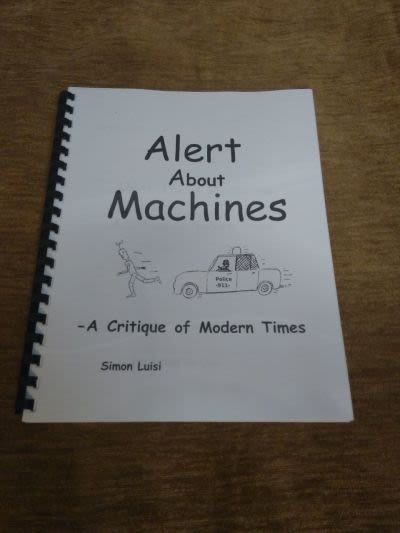
If you do possess a bit of intelligence and use it regularly, then perhaps you will react to this post's title by questioning what it seems to imply, "Are machines friendly on any level, really? Aren't machines objects? Since when do we evaluate the friendliness of objects?" And then an intelligent person would surely laugh out loud and start looking for something less absurd to read.
Thank goodness not everyone is like that and thank you for still reading this. I spent many months analyzing machines in our world in an effort to find whether their presence among us was a good or a bad thing for peoplekind. I summed up the results of my efforts in a book /essay that I self published in 2008, called, Alert About Machines.
One key point revealed by my investigations is how discouragingly hard it can be to draw the difference between a machine and a tool, and also how you can understand what distinguish you, a person, from a machine. And in this post, my intent is simply to explore further these ideas as my views have evolved since publishing my book in 2008.
First, let's start by analyzing the friendliness level of the language of machines. If a machine says really nice things, surely it should rank highly on the index of machine friendliness. But now, if the intelligent reader mentionned earlier were still here, he/she would say, "There is no evidence that machines use any language. They don't mean any of the things they do. The basis of language is to mean something. So it makes no sense whatsoever to analyze the language of machines; they simply do not have that."
Fortunately for me, such very intelligent people cannot make their point here, because this computer, which you are using right now to read this, is a machine. If they are right then you haven't heard their point of view, (this text does appear on a machine and is therefore from it, not from the protester) so we can move on unhindered.
The surprising logical opinion just mentioned above is the sort of things I have had to ponder when I wrote my book but I will not present the whole debate here; I just want to focuss on a few key notions that will enable a reader to identify the correct origin (machine or people) of what you hear and which sounds like language. First, if the language you hear is transmitted through air that is used for breath and to keep a guy heart alive, then you can bet that you are dealing with is people language. However, my research has shown that people sometimes speak like machines, especially when they speak about history or fiction. The reason is that fiction is (by definition) a language that isn't based on reality and therefore it only has the relevance that people who read it want to see in it. If the events are fictional, the language isn't really human; it is really fictional. In my opinion, fictional language and machine language are one and the same thing.
So what I'm saying is that when a person tells us fictional things in an apparent effort to pass them as real, we found ourself with a machine speaker just as much as if that person decided to tell you a fairy tale and let you know that it was fiction.
When you have a good grasp of these concepts, you begin to realize that machine language can come from you and that thinking of yourself as an occasional machine is the least crazy thing that you can think. And then you can begin to open your mind to the concept of the friendliness level of machines.
My conclusion here is that we must wary of presuming that all there is to a machine is a thing. Where ever there is the potential for fiction to appear, machines are right around the corner, waiting to appear. Just like machines can serve evil or good purposes, fiction can do the same thing. On one hand, the friendliest machines will tend to serve a good purpose. On the other hand, the least friendly machine will serve an evil purpose and there are also other machines which appear impartial and we can classify them right in the middle of the index of the friendliness of machines. If you look up the definition of a machine, you will find that it can be used to designated certain groups of people. So despite the fact that some definitions of machines do not include people, others do and I think this definition needs to be expended to fit the concept I present in here. Thanks for reading.
The photo is my own.
